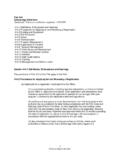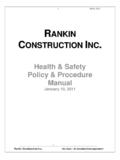Transcription of Emergency - eastcourtschool.org.uk
1 Emergency Policy Document No. 14 This document contains five Appendices Eastcourt Independent School August 2017 Last reviewed: August 2017 Next review: August 2018 Eastcourt I N D E P E N D E N T S C H O O L 1. MAJOR EMERGENCIES OCCURRING IN LONDON In the normal course of the school day, teachers will be among the last to hear of national emergencies via radio or television. In 2001 the news of 9/11 was initially conveyed by the day caretaker; in 2005 the 7/7 London bombings by the kitchen assistant. It is quite possible that telephone calls from parents will be the first point of contact or information in the event of an Emergency .
2 In the event of such a national Emergency , the main priority of staff must be to avoid distress among children at all costs Distress is caused principally by: witnessing members of staff being themselves distressed; the spreading of rumours by and among children; witnessing radio or television coverage inappropriate to the age of the children Whatever the case, the position adopted by staff must be understood clearly and undertaken without question. The following will therefore apply: Staff must at all times remain totally professional in their conduct vis- -vis the children.
3 This means behaving throughout in a calm manner that gives rise to no distress. The routine of the day, including lessons, should not be interrupted unless authorisation to do so comes from the headteacher. It is not the priority of staff to ascertain or keep up with the latest news of an Emergency while children are in their care. Staff must not question children to ascertain the possible whereabouts of members of their family. Radio, television or other news media should not be accessed by staff without permission of the headteacher, and then under the strict understanding that no children are to be present.
4 Staff who learn that they are closely involved in an Emergency , or feel that they might be, should contact the headteacher immediately to establish their best course of action. In the event that children question staff on the details or latest news of an Emergency , staff should reply calmly and non-committally, avoiding speculation, and appropriately to the age of the child. Consistent with local or national Emergency regulations, the headteacher will at her discretion allow parents to remove children from school before normal home-time.
5 Children who are not picked up at home-time will remain in the care of the headteacher and other volunteers until such time as they are called for. Provision will be made for meals, etc. _____ 2. LOCAL INCIDENT OR Emergency CLASSED AS MINOR These can be dealt with by the Emergency services and local authorities as part of their day-to-day activities. They comprise Accidents, Fire, Flooding, Security and Personal Safety, Medical Conditions, and Missing Persons. Common to all such emergencies are the following precepts for teachers: Avoid distress among children at all costs Your priority is always first to the children, rather than to the incident.
6 Accidents Accidents to staff or children on the premises may be deemed sufficiently serious to call for an ambulance, a decision taken only by either: The Headteacher Mrs Bishop (hereinafter Designated Staff ) Procedure for serious playground accidents is covered in the Staff Handbook and reproduced here: - be aware of the symptoms of serious injury: seek immediate adult assistance through more than one runner to: the nearest available teacher (to control the other children until you are available) Mrs Bishop (staff member i/c health and safety) Mrs Redgrave (to co-ordinate further procedure) - contain the Emergency area as far as possible: it may be counter-productive to involve your colleague in the other playground - be aware of all possibilities.
7 Evacuating the playground entirely allowing access for Emergency services the need to prepare accurate reports of what you know for both immediate and later use In the case of serious accidents in the classroom, teachers will remain calm at all times, defusing clamour, hysteria or panic follow the procedure in the first section above consider the immediate evacuation of the rest of the class to the nearest empty room, the nearest classroom or the corridor in that order of priority as most convenient Once Designated Staff have arrived on the scene, the teacher s duty to the casualty is discharged, and she will take charge of the remainder of the class.
8 She will follow any further instructions given by Designated Staff, for example where the class is to be taught. It will be the teacher s duty to ensure that the children, who may well be distressed, do not spread alarm or rumour. The facts and consequences of the accident should not be the subject of discussion with the children, so far as is possible. It will be the Headteacher s decision as to what and how much they are told. The teacher involved will as soon as possible be given time away from the children. She may need to prepare an accurate report of what happened for both immediate and later use, and to be available to report to medical personnel when they arrive.
9 All decisions as to what is subsequently reported, to whom and when, are taken by the Headteacher alone. Procedure in the case of a teacher becoming seriously ill, or of any accident taking place elsewhere than in the playground or classroom, will with necessary changes be equivalent to the above. Fire Procedure in the case of fire is clearly designated in each classroom, and fire drills are undertaken each half term. Non-teaching staff are familiar with these procedures. Flooding This is more likely to occur as a result of a plumbing accident than from adverse weather.
10 In the case of standing water or its imminent likelihood in any part of the school, the Headteacher must be informed immediately, and the area cordoned off as far as is practicable. In a severe case it may be necessary to evacuate a classroom or an entire floor before assistance arrives. Since physical danger is usually less urgent, emphasis must be on sensible behaviour from the children. The Fire Brigade will be summoned to prevent serious damage to the fabric or structure of the school. Security and Personal Safety The Centenary Gates are kept locked or under the supervision of a teacher or parent during school hours.





